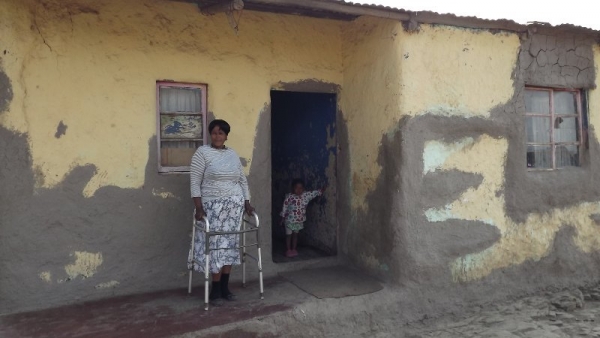The long walk to social grants

From Elandskop in Pietermaritzburg to the nearest SA Social Security Agency (SASSA) office is 53 kilometres, a journey which is not possible for Gabisile Gcumisa. Gcumisa, who weighs 268kg and has a heart condition, would not have been able to access her social grant without the help of community caregivers.
With only two close SASSA offices in the Greater Edendale areas in Pietermaritzburg, applying for a social grant is hard, if not impossible, for some. The Vulindlela office in Greater Edendale offers its services to people from Imbali, Dambuza, Machibisa and other areas and more than 100 people come to the office daily. In the city centre, an office in Pietermaritz Street caters for residents of Elandskop, Sweetwaters and other parts of the city.
But the 53 kilometre journey from Elandskop costs R28 return by taxi, a sum which is out of the reach of many people in the area, even those who are more mobile than Gcumisa.
Gcumisa, who is unemployed, was helped by a community caregiver employed by the KwaZulu-Natal health department. She had no transport to take her to the offices and she did not know how to approach the social welfare department.
Bawinile Shezi, one of about ten caregivers employed in the Edendale area, arranged for social workers to come and see Gcumisa in her home and this year she received her social grant in May for the first time.
“I met her in February when I was doing home visits in the area,” said Shezi. ”Her story touched me and I made a vow to help her. I managed to get social workers for home visits. It took some time but I finally succeeded. After the home visits she was approved as a grant beneficiary and she now receives her grant,” said Shezi.
Vusi Mahaye, spokesman for SASSA in KwaZulu-Natal, said the department of social welfare was made aware of cases like Gcumisa’s by the community caregivers in the area. “They are the link between the community and the department. Once they discover that there is a person who needs help, they contact the department. The social workers conduct home visits and we take it from there,” said Mahaye.
The caregivers earn R1,500 a month. But though they visit up to three households a day, they do not reach everyone.
Fifty-year-old Thoko Khambule of Imbali has given up trying for her grandchildren’s grants. She lives with five orphans between the ages of five and ten. Last year she was diagnosed with TB of the foot.
Her 18-year-old son Fana Khambule had to drop out of grade 9 to take care of his sick mother.
Her ID was stolen when she was in hospital for an operation last year. And she does not have the documents the SASSA offices need in order to access child grants.
“I live with five orphans and all of them are at school. Three of them are my late sister’s children who are in high school. The other two are my sister’s eldest daughter’s children. I don’t know their fathers. My daughter told me their fathers died and that is what I tell the officials at SASSA offices. But each time I try to apply for the grant they tell me to look for the fathers whom I don’t know. I was told they died.
“Where will I look for the fathers of these children?” she asked
Mahaye said Khambule had to provide SASSA with a death certificate or an affidavit. The matter should start from the social workers then go to the department of Justice then SASSA,” he said.
Community caregiver Mathombi Mbhele from Imbali said sometimes she and her colleagues had to use money from their own pockets to help applicants.
“We are forced to use our own money. Transport is needed to reach the offices since they are not close. We don’t go there once or twice. It is always more than that,” she said. “We have people who are clueless on what to do or where to go with regard to grant applications. Sometimes we are caught up in a situation where we end up with a long list of people who need help. We can’t help all of them at one time and that becomes a problem.”
“We need transport for people who are poor and disabled,” said Mbhele.
See Everything you probably need to know about social grants.
Support independent journalism
Donate using Payfast


This article is licensed under a Creative Commons Attribution-NoDerivatives 4.0 International License.
